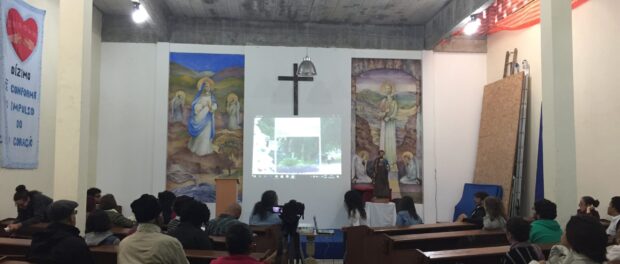
Fighting to continue to make space for often-silenced voices, the Evictions Museum, Vila Autodromo and the Network of Social Museology of Rio de Janeiro partnered to offer a three-day course entitled “Social Museology: Poetics and Politics in Movement, Based in Concrete Experiences.” The seminars took place May 19-21 in Vila Autódromo’s Catholic Church, the only building preserved during evictions and demolitions carried out before the Olympic Games, and a symbol of the community’s struggle. The church served as a storage space during demolitions, keeping residents’ furniture safe and becoming the new headquarters of the residents’ association, and is now part of the Evictions Museum.
Students, museologists, Vila Autódromo residents, members of other favela museums, activists, and even a few community pets (dogs abandoned during the eviction process who were adopted and taken care of by remaining residents) filled the church during a weekend of rain and wind. Activist and resident Maria da Penha was the first to welcome everyone and emphasize the importance of the Evictions Museum and their archives, presented to the National Historic Museum (MHN) the day before. “My dream is that, through our struggle, other communities won’t suffer eviction,” Penha explained.
Museology as resistance was a theme that set the stage for the rest of the day. Dr. Mario de Souza Chagas, involved in the creation of many of Rio’s community museums, talked about the importance of museums as “a commitment to life and social transformation.” Throughout the first two days of the course, Chagas, a poet, museologist, and professor of social sciences, presented a seminar originally given in January at the École du Louvre in Paris. With modules focusing on the decolonization of museology, memory and social museology, and social museology in practice in Rio’s community museums, Chagas’ presentations continually stressed the idea that “a museology that does not serve life–both organic and social–serves nothing.”
As the event’s hosts, voices from Vila Autódromo were prominent throughout the event. On Friday, Sandra Maria, a resident and long-time activist, presented the community’s history and pieces from the evictions process that are now in the collection at the MHN. On Saturday, participants in the seminar took a tour around Vila Autódromo itself. The whole community forms part of the archive of the territorial elements of the Evictions Museum, a testament to the community’s resistance and resilience in the face of trauma. One piece in the museum’s collection, for example, is a barricade put up by community members during the Olympics, when cars and buses would use Vila Autódromo’s main road as a shortcut into the Olympic Park, putting residents and animals in danger. This structure, built out of necessity, remains part of the landscape of the community, part of the open-air museum that triggers memory throughout the daily routine in the favela.
The course also marked a major public event, not only for Vila Autódromo’s Evictions Museum, but for the Social Museology Network, a group founded in 2013 that links community museums throughout Rio. Once a relatively obscure phenomenon, favela museums have become increasingly visible in recent years, even as the physical institutions themselves struggle with debt and eviction threats. The event at Vila Autódromo brought together the Museu da Maré, Living Museum of São Bento in Duque de Caxias, Museu de Favela (MUF) in Pavão-Pavãozinho and Cantagalo, Museu Sankofa in Rocinha, Ecomuseum Nega Vilma in Santa Marta, Ecomuseum Friends of Rio Joana, Ecomuseu of Manguinhos, Horto Museum, and Evictions Museum as emblems of a “new museum imagination” that has deep historical roots in Rio and other contemporary examples across the world, from Niger to the United States and Chile. Increased communication among these museums will help them not only fight more effectively for their permanence, but also share information and ideas and articulate their message more clearly.

The third day of the course put the ideas presented so far into practice, with participants bringing objects associated with their own memories and making impromptu exhibits out of them, then doing the same with plaques commemorating demolished parts of Vila Autódromo. The weekend ended with a public screening of Resistência, a documentary directed by Eliza Capai about protest during the current Brazilian political crisis.
Throughout its three days, the course relied on the idea of museums as a place of both memory and action, a “space for acting politically” as well as “pretext for celebrating life.” Favela and community museums are crucial spaces for making community voices heard, as well as dealing with issues that touch contemporary life. The philosophy behind these spaces relies on active participation between the museum and its visitors, as both affect and are affected by the other. As the voices of community museums continue to strengthen, this vibrant, intimate conception of memory and the museum experience will become more prominent as well, inspiring both favela residents and visitors to think about the past, present, and future in new ways.



